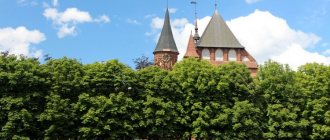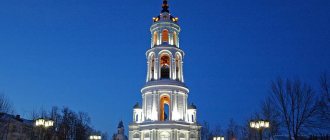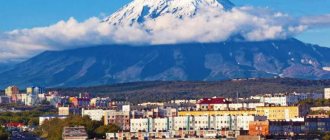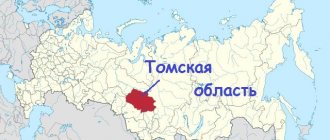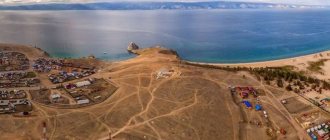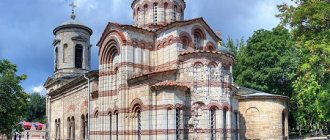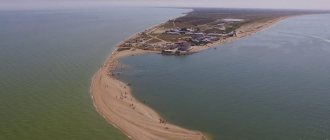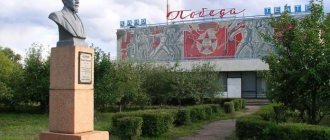Russia \ Adygea \ Cities and villages
Mountainous and forested Adygea cannot boast of a high population density, huge cities or an abundance of villages, towns and villages. The largest city, the capital of the republic, Maykop, with a population of about 150 thousand people, can hardly be called a metropolis. However, despite some interesting sights, as a rule, other settlements attract tourists.
First of all, the village of Kamennomostsky, located surrounded by numerous natural attractions. Even further, on the border with the Caucasian State Reserve, Guzeripl is located. It is also worth paying attention to small settlements, often adjacent to some attractions. For example, the village of Pobeda near the St. Michael’s Monastery or the village of Dakhovskaya, the village of Khamyshki and other villages.
What holiday is it today?
January 22, 2022, Saturday
Today are holidays, events: Day of Unification of Ukraine Tomorrow: Premiere of the opera “Eugene Onegin” at the Bolshoi Theater
Today is the Orthodox holiday: Martyr Polyeuctus. St. Philip, Metropolitan of Moscow and All Russia, wonderworker... Tomorrow: St. Gregory, Bishop of Nyssa. Venerable Markian the presbyter. Venerable Dometian, Bishop of Melitino. St. Paul of Komel, wonderworker, student of St. Sergius of Radonezh. Saint Theophan, the Recluse of Vyshensky...
Today is a national holiday: St. Philip's Day... Tomorrow: Gregory - Summer Guide...
Seasons
Seasons, four periods of the year (spring, summer, autumn and winter) characterized by certain average temperatures. The period during which the Sun passes through one of these sectors is called the season. Spring in the Northern Hemisphere and autumn in the Southern Hemisphere begin when the Sun passes through the initial circle of declination and its right ascension is 0° (vernal equinox). Summer in the Northern Hemisphere and winter in the Southern Hemisphere occur when the sun's right ascension is 90° (summer solstice). Autumn in the Northern Hemisphere and spring in the Southern Hemisphere begin when the sun's right ascension is 180° (autumnal equinox). The beginning of winter in the Northern Hemisphere and summer in the Southern Hemisphere is considered to be the winter solstice, when the direct ascension of the Sun is 270°... Next: Seasons. Russian folk calendar. Monthly words...
Marriages and divorces
If we consider residents from the point of view of marriages and official divorces, the State Statistics Service provides the following data.
Number of marriages by year over the past 30 years:
- In 1991 – 3944.
- In 1995 – 3601.
- In 2000 – 2675.
- In 2005 – 3070.
- In 2010 – 3454.
- In 2012 – 3384.
- In 2013 – 3308.
- In 2014 – 3026.
- In 2015 – 2790.
- In 2016 – 2382.
- In 2022 – 2513.
- In 2022 – 2037.
Analyzing the data presented, we can conclude that despite the increase in numbers, the number of registered marriages in the republic is decreasing.
As for divorces, the statistics here are as follows for the same reporting period:
- In 1999 – 1827.
- In 1995 – 1816.
- In 2000 – 2022.
- In 2005 – 1566.
- In 2010 – 1698.
- In 2011 – 1849.
- In 2012 – 1767.
- In 2013 – 1905.
- In 2014 – 1842.
- In 2015 – 1581.
- In 2016 – 1651.
- In 2022 – 1653.
- In 2022 – 1627.
If we analyze the data on divorces, the situation looks like this: despite the decreased number of marriages, the situation with divorces is not decreasing. Despite the fact that the fluctuations here do not seem so significant, they must be correlated with the fact that the number of registered unions is decreasing. Thus, we can conclude that the number of couples who end their life together with divorce, although not so significant, is still increasing.
Folk calendar about every day
Every day one season always replaces another and this determines a person’s way of life. In connection with this, a folk calendar was formed in which there were practically no nameless, unmarked days. Every day was special, had its own purpose. All this was determined by climate conditions and astrological phenomena.
A calendar is a system for counting periods of time. The first calendars arose a long time ago, in ancient times, because there was a need to measure time. The word calendar comes from the Latin words caleo - to proclaim and calendarium - debt book. This is due to the fact that in Ancient Rome the beginning of each month was especially proclaimed, and because it was customary to pay debts on the first day of the month. Different peoples counted time differently. Some calendars are based on the changing phases of the moon - lunar calendars; in others - the change of seasons - sunny; in others, the length of the year was coordinated with the change of seasons, and the counting of months was associated with the phases of the Moon. Such calendars are called lunisolar.
In Rus', the calendar was called a monthly calendar. Every day, the month book covered the entire year of peasant life, “describing” day by day, month after month, where each day had its own holidays or weekdays, customs and superstitions, traditions and rituals, natural signs and phenomena. The cyclical nature of the calendar is reminiscent of human life, where spring is youth, summer is heyday, autumn is the time of harvesting fruits (it’s good if there are some, otherwise you can live your life without collecting fruits), winter is the time of wisdom and peace. This cyclicality and rhythm determined the way of life of the farmer. The folk calendar was an agricultural calendar, which was reflected in the names of the months, folk signs, rituals and customs. Even the determination of the timing and duration of the seasons is associated with real climatic conditions. Hence the discrepancy between the names of the months in different areas... Next: Folk calendar...
How to get to Adygea
The Maikop - Guzeripl highway is the main tourist road of Adygea.
The Republic of Adygea can be reached in several ways:
- Airplane . The best option. The nearest airport is in Krasnodar; the flight from Moscow is just over two hours. You can get to Maykop from Krasnodar by bus in an hour and a half.
- Car . You will have to travel 1,400 km along the M-4 Don highway from Moscow to Maykop. Minimum time is 16 hours. How much it will increase depends on the number and duration of stops along the way.
- Train . From Moscow and St. Petersburg you can get to Adygea by train only with a change in Tuapse. The journey from the capital will take just under 36 hours.
Fishing calendar for every day
The fishing calendar should not be taken as an absolutely indisputable truth. Fish biting is greatly influenced by a whole range of natural factors, as well as the influence on the nature of man himself. You must not forget that the fish’s bite depends and is determined not only by the calendar dates and biological cycles of their life, reflected in the calendar, but also, no less, by the state of their habitat; the bite also depends on weather conditions: air and water temperatures, cloudiness, wind direction and strength, etc... Next: Fishing calendar...
What to do in Adygea
Horseback riding tours are very popular in Adygea.
People come to Adygea for active recreation, natural beauty and medical procedures. The Adyghe Mountains are very popular - they are included in the UNESCO World Heritage List. There are many tourist routes of varying levels of difficulty in the Caucasus Nature Reserve. Local waterfalls, caves, forests and mountain rivers are also impressive.
Extreme sports are represented in the republic in different forms:
- Canyoning;
- rafting;
- hang gliding;
- horseback riding;
- mountaineering;
- skiing.
But first of all, tourists are interested in thermal springs. The vast majority of them are located on the territory of tourist complexes, but there are also freely accessible sources.
Orthodox calendar about every day
Orthodox calendar: Orthodox, Church and Christian holidays.
The church year is an alternation of weekdays and holidays. On weekdays, a person is called to work “by the sweat of his brow to earn his bread.” Holidays are given in order to feel liberation, to rise above the bustle and routine of the world, to feel involved in the highest of worlds, “where there are no illnesses, sorrows and sighs, but endless life.” Since ancient times, holiday cycles have been associated with the seasons. The pagans associated them with the worship of the forces of nature, the cult of which in the Old Testament was replaced by gratitude to the Creator for the universe. And although the connection between holidays and the seasons has not completely lost its power, since God is present in everything, in the plant and animal world, in human works, it nevertheless faded into the background, giving way to a spiritual foundation built on the Sacred Scriptures. The history of Orthodox holidays dates back to the times of the Old Testament. Each of the Orthodox holidays is dedicated to the remembrance of the most important events in the life of Jesus Christ and the Mother of God, as well as the memory of saints... Next: Orthodox calendar...
Kamennomostsky (Hadzhokh)
The village of Kamennomostsky is located in Adygea, on the banks of the Belaya River, south of Maykop (26 kilometers south of the village of Tulsky). During the Russian-Caucasian War, on the territory of the modern village there was the Adyghe village of Khodzhiko, famous for its long defense under the leadership of Shamil against Russian troops. In 1862, a Cossack defensive post was erected on the site of an aul devastated in battle. Two years later, the village of Kamennomostskaya was founded in its place, and in the period from 1873-1914. The village acquired the status of a village.
Subsections:
Attractions How to get there Trip reports Leisure
Russian folk calendar for every day
The word “sign” comes from the word “notice”, i.e. observe. As a result of observing what happens around a person every day, he accumulates life experience. This knowledge was passed down from generation to generation, carefully preserved and people trusted it as a sacred book. Many signs have come to us from the depths of centuries without losing their knowledge. Each of us is free to choose: to dismiss all this as an absurd superstition or to take a closer look at the signs and take the centuries-old experience of generations more seriously. Most of us, when taking exams, ask them to scold them, boasting about some kind of good fortune or luck, spit so as not to jinx them or knock on wood, take a detour if a black cat crossed the road, are afraid of the number 13 and much more. And who among us does not have lucky things, numbers? Who has never resorted to the help of fate at least once in their life, who has not believed in secrets? It’s as if everything connected with signs is hidden somewhere deep in our subconscious. Often we remember them mechanically, unconsciously, or just as a joke. But, undoubtedly, the signs contain a lot of accurate knowledge and practical wisdom of our ancestors. They cover all the characteristic, often difficult to perceive, natural phenomena. Signs have preserved a lot of what was in old folk holidays and customs; they help predict the weather, grow crops... Next: Folk signs...
An excerpt characterizing the settlements of Adygea
- I am for Dolokhov! - shouted the third. - Take them apart, Kuragin. - Well, leave Mishka, there’s a bet here. “One spirit, otherwise it’s lost,” shouted the fourth. - Yakov, give me a bottle, Yakov! - shouted the owner himself, a tall handsome man standing in the middle of the crowd wearing only a thin shirt open at the middle of his chest. - Stop, gentlemen. Here he is Petrusha, dear friend,” he turned to Pierre. Another voice of a short man with clear blue eyes, which was especially striking among all these drunken voices with its sober expression, shouted from the window: “Come here - settle the bet!” It was Dolokhov, a Semyonov officer, a famous gambler and brigand who lived with Anatole. Pierre smiled, looking around him cheerfully. - I don’t understand anything. What's the matter? - Wait, he's not drunk. Give me the bottle,” said Anatole and, taking a glass from the table, approached Pierre. - First of all, drink. Pierre began drinking glass after glass, looking from under his brows at the drunken guests who were again crowded at the window, and listening to their conversation. Anatole poured him wine and told him that Dolokhov was betting with the Englishman Stevens, a sailor who was here, that he, Dolokhov, would drink a bottle of rum while sitting on the third floor window with his legs hanging out. - Well, drink it all! - said Anatole, handing the last glass to Pierre, - otherwise I won’t let you in! “No, I don’t want to,” Pierre said, pushing Anatole away and went to the window. Dolokhov held the Englishman’s hand and clearly, distinctly spelled out the terms of the bet, addressing mainly Anatole and Pierre. Dolokhov was a man of average height, with curly hair and light blue eyes. He was about twenty-five years old. He did not wear a mustache, like all infantry officers, and his mouth, the most striking feature of his face, was completely visible. The lines of this mouth were remarkably finely curved. In the middle, the upper lip energetically dropped onto the strong lower lip like a sharp wedge, and something like two smiles constantly formed in the corners, one on each side; and all together, and especially in combination with a firm, insolent, intelligent gaze, it created such an impression that it was impossible not to notice this face. Dolokhov was a poor man, without any connections. And despite the fact that Anatole lived in tens of thousands, Dolokhov lived with him and managed to position himself in such a way that Anatole and everyone who knew them respected Dolokhov more than Anatole. Dolokhov played all the games and almost always won. No matter how much he drank, he never lost his clarity of mind. Both Kuragin and Dolokhov at that time were celebrities in the world of rakes and revelers in St. Petersburg. A bottle of rum was brought; the frame that did not allow anyone to sit on the outer slope of the window was broken out by two footmen, apparently in a hurry and timid from the advice and shouts of the surrounding gentlemen. Anatole walked up to the window with his victorious look. He wanted to break something. He pushed the lackeys away and pulled the frame, but the frame did not give up. He broke the glass. “Well, how are you, strong man,” he turned to Pierre. Pierre took hold of the crossbars, pulled, and with a crash the oak frame turned out. “Get out, otherwise they’ll think I’m holding on,” said Dolokhov. “The Englishman is bragging... huh?... good?...” said Anatole. “Okay,” said Pierre, looking at Dolokhov, who, taking a bottle of rum in his hands, was approaching the window from which the light of the sky and the morning and evening dawns merging on it could be seen. Dolokhov, with a bottle of rum in his hand, jumped up onto the window. "Listen!" he shouted, standing on the windowsill and turning into the room. Everyone fell silent. - I bet (he spoke French so that an Englishman could understand him, and did not speak this language very well). I bet you fifty imperials, would you like a hundred? - he added, turning to the Englishman. “No, fifty,” said the Englishman. - Okay, for fifty imperials - that I will drink the entire bottle of rum without taking it from my mouth, I will drink it while sitting outside the window, right here (he bent down and showed the sloping ledge of the wall outside the window) and without holding on to anything... So? ... “Very good,” said the Englishman. Anatole turned to the Englishman and, taking him by the button of his tailcoat and looking down at him (the Englishman was short), began repeating to him the terms of the bet in English. - Wait! - Dolokhov shouted, banging the bottle on the window to attract attention. - Wait, Kuragin; listen. If anyone does the same, then I pay one hundred imperials. Do you understand? The Englishman nodded his head, not giving any indication as to whether he intended to accept this new bet or not. Anatole did not let go of the Englishman and, despite the fact that he nodded, letting him know that he understood everything, Anatole translated Dolokhov’s words to him in English. A young thin boy, a life hussar, who had lost that evening, climbed onto the window, leaned out and looked down. “Uh!... uh!... uh!...” he said, looking out the window at the stone sidewalk. - Attention! - Dolokhov shouted and pulled the officer from the window, who, entangled in his spurs, awkwardly jumped into the room. Having placed the bottle on the windowsill so that it would be convenient to get it, Dolokhov carefully and quietly climbed out the window. Dropping his legs and leaning both hands on the edges of the window, he measured himself, sat down, lowered his hands, moved to the right, to the left and took out a bottle. Anatole brought two candles and put them on the windowsill, although it was already quite light. Dolokhov's back in a white shirt and his curly head were illuminated from both sides. Everyone crowded around the window. The Englishman stood in front. Pierre smiled and said nothing. One of those present, older than the others, with a frightened and angry face, suddenly moved forward and wanted to grab Dolokhov by the shirt. - Gentlemen, this is nonsense; he will be killed to death,” said this more prudent man. Anatole stopped him: “Don’t touch him, you’ll scare him, he’ll kill himself.” Eh?... What then?... Eh?... Dolokhov turned around, straightening himself up and again spreading his arms. “If anyone else bothers me,” he said, rarely letting words slip through his clenched and thin lips, “I’ll bring him down here now.” Well!... Saying “well”!, he turned around again, let go of his hands, took the bottle and brought it to his mouth, threw his head back and threw his free hand up for leverage. One of the footmen, who began to pick up the glass, stopped in a bent position, not taking his eyes off the window and Dolokhov’s back. Anatole stood straight, eyes open. The Englishman, his lips thrust forward, looked from the side. The one who stopped him ran to the corner of the room and lay down on the sofa facing the wall. Pierre covered his face, and a weak smile, forgotten, remained on his face, although it now expressed horror and fear. Everyone was silent. Pierre took his hands away from his eyes: Dolokhov was still sitting in the same position, only his head was bent back, so that the curly hair of the back of his head touched the collar of his shirt, and the hand with the bottle rose higher and higher, shuddering and making an effort. The bottle was apparently emptied and at the same time rose, bending its head. “What’s taking so long?” thought Pierre. It seemed to him that more than half an hour had passed. Suddenly Dolokhov made a backward movement with his back, and his hand trembled nervously; this shudder was enough to move the entire body sitting on the sloping slope. He shifted all over, and his hand and head trembled even more, making an effort. One hand rose to grab the window sill, but dropped again. Pierre closed his eyes again and told himself that he would never open them. Suddenly he felt that everything around him was moving. He looked: Dolokhov was standing on the windowsill, his face was pale and cheerful. - Empty! He threw the bottle to the Englishman, who deftly caught it. Dolokhov jumped from the window. He smelled strongly of rum. - Great! Well done! So bet! Damn you completely! - they shouted from different sides. The Englishman took out his wallet and counted out the money. Dolokhov frowned and was silent. Pierre jumped onto the window. Gentlemen! Who wants to bet with me? “I’ll do the same,” he suddenly shouted. “And there’s no need for a bet, that’s what.” They told me to give him a bottle. I'll do it... tell me to give it. - Let it go, let it go! – said Dolokhov, smiling. - What you? crazy? Who will let you in? “Your head is spinning even on the stairs,” they spoke from different sides. - I'll drink it, give me a bottle of rum! - Pierre shouted, hitting the table with a decisive and drunken gesture, and climbed out the window. They grabbed him by the arms; but he was so strong that he pushed the one who approached him far away. “No, you can’t persuade him like that,” said Anatole, “wait, I’ll deceive him.” Look, I bet you, but tomorrow, and now we're all going to hell. “We’re going,” Pierre shouted, “we’re going!... And we’re taking Mishka with us... And he grabbed the bear, and, hugging and lifting him, began to spin around the room with him. Prince Vasily fulfilled the promise made at the evening at Anna Pavlovna's to Princess Drubetskaya, who asked him about her only son Boris. He was reported to the sovereign, and, unlike others, he was transferred to the Semenovsky Guard Regiment as an ensign. But Boris was never appointed as an adjutant or under Kutuzov, despite all the efforts and machinations of Anna Mikhailovna. Soon after Anna Pavlovna's evening, Anna Mikhailovna returned to Moscow, straight to her rich relatives Rostov, with whom she stayed in Moscow and with whom her beloved Borenka, who had just been promoted to the army and was immediately transferred to guards ensigns, had been raised and lived for years since childhood. The Guard had already left St. Petersburg on August 10, and the son, who remained in Moscow for uniforms, was supposed to catch up with her on the road to Radzivilov. The Rostovs had a birthday girl, Natalya, a mother and a younger daughter. In the morning, without ceasing, trains drove up and drove off, bringing congratulators to the large, well-known house of Countess Rostova on Povarskaya throughout Moscow. The countess with her beautiful eldest daughter and guests, who never ceased replacing one another, were sitting in the living room. The Countess was a woman with an oriental type of thin face, about forty-five years old, apparently exhausted by children, of whom she had twelve. The slowness of her movements and speech, resulting from weakness of strength, gave her a significant appearance that inspired respect. Princess Anna Mikhailovna Drubetskaya, like a domestic person, sat right there, helping in the matter of receiving and engaging in conversation with the guests. The youth were in the back rooms, not finding it necessary to participate in receiving visits. The Count met and saw off the guests, inviting everyone to dinner. “I am very, very grateful to you, ma chere or mon cher [my dear or my dear] (ma chere or mon cher he said to everyone without exception, without the slightest shade, both above and below him) for himself and for the dear birthday girls . Look, come and have lunch. You will offend me, mon cher. I sincerely ask you on behalf of the whole family, ma chere.” He spoke these words with the same expression on his full, cheerful, clean-shaven face and with an equally strong handshake and repeated short bows to everyone, without exception or change. Having seen off one guest, the count returned to whoever was still in the living room; having pulled up his chairs and with the air of a man who loves and knows how to live, with his legs spread gallantly and his hands on his knees, he swayed significantly, offered guesses about the weather, consulted about health, sometimes in Russian, sometimes in very bad but self-confident French, and again with the air of a tired but firm man in the performance of his duties, he went to see him off, straightening the sparse gray hair on his bald head, and again called for dinner. Sometimes, returning from the hallway, he walked through the flower and waiter's room into a large marble hall, where a table for eighty couverts was being set, and, looking at the waiters wearing silver and porcelain, arranging tables and unrolling damask tablecloths, he called Dmitry Vasilyevich, a nobleman, to him. who was taking care of all his affairs, and said: “Well, well, Mitenka, make sure everything is fine. “Well, well,” he said, looking around with pleasure at the huge spread-out table. – The main thing is serving. This and that...” And he left, sighing complacently, back into the living room. - Marya Lvovna Karagina with her daughter! - the huge countess's footman reported in a bass voice as he entered the living room door. The Countess thought and sniffed from a golden snuffbox with a portrait of her husband. “These visits tormented me,” she said. - Well, I’ll take her last one. Very prim. “Beg,” she said to the footman in a sad voice, as if she was saying: “Well, finish it off!” A tall, plump, proudly looking lady with a round-faced, smiling daughter, rustling with their dresses, entered the living room. “Chere comtesse, il ya si longtemps... elle a ete alitee la pauvre enfant... au bal des Razoumowsky... et la comtesse Apraksine... j'ai ete si heureuse...” [Dear countess, how long ago... she should have been in bed, poor child... at the Razumovskys' ball... and Countess Apraksina... was so happy...] animated women's voices were heard, interrupting one another and merging with the noise of dresses and the moving of chairs. That conversation began, which is started just enough so that at the first pause you can stand up, rustle with your dresses, and say: “Je suis bien charmee; la sante de maman... et la comtesse Apraksine" [I am in admiration; mother’s health... and Countess Apraksina] and, again rustling with dresses, go into the hallway, put on a fur coat or cloak and leave. The conversation turned to the main city news of that time - about the illness of the famous rich and handsome man of Catherine's time, old Count Bezukhy, and about his illegitimate son Pierre, who behaved so indecently at an evening with Anna Pavlovna Scherer. “I really feel sorry for the poor count,” said the guest, “his health is already bad, and now this grief from his son will kill him!” - What's happened? - asked the countess, as if not knowing what the guest was talking about, although she had already heard the reason for Count Bezukhy’s grief fifteen times. - This is the current upbringing! “Even abroad,” said the guest, “this young man was left to his own devices, and now in St. Petersburg, they say, he did such horrors that he was expelled from there with the police. - Tell! - said the countess. “He chose his acquaintances poorly,” Princess Anna Mikhailovna intervened. - The son of Prince Vasily, he and Dolokhov alone, they say, God knows what they were doing. And both were hurt. Dolokhov was demoted to the ranks of soldiers, and Bezukhy’s son was exiled to Moscow. Anatoly Kuragin - his father somehow hushed him up. But they did deport me from St. Petersburg. - What the hell did they do? – asked the Countess. “These are perfect robbers, especially Dolokhov,” said the guest. - He is the son of Marya Ivanovna Dolokhova, such a respectable lady, so what? You can imagine: the three of them found a bear somewhere, put it in a carriage and took it to the actresses. The police came running to calm them down. They caught the policeman and tied him back to back to the bear and let the bear into the Moika; the bear is swimming, and the policeman is on him. “The policeman’s figure is good, ma chere,” shouted the count, dying of laughter. - Oh, what a horror! What's there to laugh about, Count? But the ladies couldn’t help but laugh themselves. “They saved this unfortunate man by force,” the guest continued. “And it’s the son of Count Kirill Vladimirovich Bezukhov who is playing so cleverly!” – she added. “They said he was so well-mannered and smart.” This is where all my upbringing abroad has led me. I hope that no one will accept him here, despite his wealth. They wanted to introduce him to me. I resolutely refused: I have daughters. - Why do you say that this young man is so rich? - asked the countess, bending down from the girls, who immediately pretended not to listen. - After all, he only has illegitimate children. It seems... Pierre is also illegal. The guest waved her hand. “He has twenty illegal ones, I think.” Princess Anna Mikhailovna intervened in the conversation, apparently wanting to show off her connections and her knowledge of all social circumstances. “That’s the thing,” she said significantly and also in a half-whisper. – The reputation of Count Kirill Vladimirovich is known... He lost count of his children, but this Pierre was beloved. “How good the old man was,” said the countess, “even last year!” I have never seen a more beautiful man. “Now he’s changed a lot,” said Anna Mikhailovna. “So I wanted to say,” she continued, “through his wife, Prince Vasily is the direct heir to the entire estate, but his father loved Pierre very much, was involved in his upbringing and wrote to the sovereign... so no one knows if he dies (he is so bad that they are waiting for it) every minute, and Lorrain came from St. Petersburg), who will get this huge fortune, Pierre or Prince Vasily. Forty thousand souls and millions. I know this very well, because Prince Vasily himself told me this. And Kirill Vladimirovich is my second cousin on my mother’s side. “He baptized Borya,” she added, as if not attributing any significance to this circumstance. – Prince Vasily arrived in Moscow yesterday. He’s going for an inspection, they told me,” the guest said. “Yes, but, entre nous, [between us],” said the princess, “this is an excuse, he actually came to Count Kirill Vladimirovich, having learned that he was so bad.” “However, ma chere, this is a nice thing,” said the count and, noticing that the eldest guest was not listening to him, he turned to the young ladies. – The policeman had a good figure, I imagine. And he, imagining how the policeman waved his arms, laughed again with a sonorous and bassy laugh that shook his entire plump body, as people laugh who have always eaten well and especially drunk. “So, please, come and have dinner with us,” he said. There was silence. The Countess looked at the guest, smiling pleasantly, however, without hiding the fact that she would not be at all upset now if the guest got up and left. The guest's daughter was already straightening her dress, looking questioningly at her mother, when suddenly from the next room several men's and women's feet were heard running towards the door, the crash of a chair being snagged and knocked over, and a thirteen-year-old girl ran into the room, wrapping something in her short muslin skirt, and stopped in the middle rooms. It was obvious that she accidentally, with an uncalculated run, ran so far. At the same moment a student with a crimson collar, a guards officer, a fifteen-year-old girl and a fat, ruddy boy in a children's jacket appeared at the door. The count jumped up and, swaying, spread his arms wide around the running girl. - Oh, here she is! – he shouted laughing. - Birthday girl! Ma chere, birthday girl! “Ma chere, il ya un temps pour tout, [Darling, there is time for everything,” said the countess, pretending to be stern. “You keep spoiling her, Elie,” she added to her husband. “Bonjour, ma chere, je vous felicite, [Hello, my dear, I congratulate you,” said the guest. – Quelle delicuse enfant! “What a lovely child!” she added, turning to her mother. A dark-eyed, big-mouthed, ugly, but lively girl, with her childish open shoulders, which, shrinking, moved in her bodice from fast running, with her black curls bunched back, thin bare arms and small legs in lace pantaloons and open shoes, I was at that sweet age when a girl is no longer a child, and a child is not yet a girl. Turning away from her father, she ran up to her mother and, not paying any attention to her stern remark, hid her flushed face in the lace of her mother’s mantilla and laughed. She was laughing at something, talking abruptly about a doll that she had taken out from under her skirt. – See?... Doll... Mimi... See. And Natasha could no longer speak (everything seemed funny to her). She fell on top of her mother and laughed so loudly and loudly that everyone, even the prim guest, laughed against their will. - Well, go, go with your freak! - said the mother, feigning angrily pushing her daughter away. “This is my youngest,” she turned to the guest. Natasha, taking her face away from her mother’s lace scarf for a minute, looked at her from below through tears of laughter and hid her face again. The guest, forced to admire the family scene, considered it necessary to take some part in it. “Tell me, my dear,” she said, turning to Natasha, “how do you feel about this Mimi?” Daughter, right? Natasha did not like the tone of condescension to childish conversation with which the guest addressed her. She did not answer and looked at her guest seriously. Meanwhile, all this young generation: Boris - an officer, the son of Princess Anna Mikhailovna, Nikolai - a student, the eldest son of the count, Sonya - the count's fifteen-year-old niece, and little Petrusha - the youngest son, all settled in the living room and, apparently, tried to keep within the boundaries of decency the animation and gaiety that still breathed from every feature of them. It was clear that there, in the back rooms, from where they all ran so quickly, they were having more fun conversations than here about city gossip, the weather and Comtesse Apraksine. [about Countess Apraksina.] Occasionally they glanced at each other and could hardly restrain themselves from laughing. Two young men, a student and an officer, friends since childhood, were the same age and both were handsome, but did not look alike. Boris was a tall, fair-haired young man with regular, delicate features of a calm and handsome face; Nikolai was a short, curly-haired young man with an open expression on his face. Black hairs were already showing on his upper lip, and his whole face expressed impetuosity and enthusiasm. Nikolai blushed as soon as he entered the living room. It was clear that he was searching and could not find anything to say; Boris, on the contrary, immediately found himself and told him calmly, jokingly, how he knew this Mimi doll as a young girl with an undamaged nose, how she grew old in his memory at the age of five and how her head was cracked all over her skull. Having said this, he looked at Natasha. Natasha turned away from him, looked at her younger brother, who, with his eyes closed, was shaking with silent laughter, and, unable to hold on any longer, jumped and ran out of the room as quickly as her fast legs could carry her. Boris didn't laugh. - You seemed to want to go too, maman? Do you need a carriage? – he said, turning to his mother with a smile. “Yes, go, go, tell me to cook,” she said, pouring out. Boris quietly walked out the door and followed Natasha, the fat boy angrily ran after them, as if annoyed at the frustration that had occurred in his studies. Of the young people, not counting the countess's eldest daughter (who was four years older than her sister and already behaved like a grown-up) and the young lady's guest, Nikolai and Sonya's niece remained in the living room. Sonya was a thin, petite brunette with a soft gaze, shaded by long eyelashes, a thick black braid that wrapped around her head twice, and a yellowish tint to the skin on her face and especially on her bare, thin, but graceful, muscular arms and neck. With the smoothness of her movements, the softness and flexibility of her small limbs, and her somewhat cunning and reserved manner, she resembled a beautiful, but not yet fully formed kitten, which would become a lovely little cat. She apparently considered it decent to show participation in the general conversation with a smile; but against her will, from under her long thick eyelashes, she looked at her cousin [cousin] who was leaving for the army with such girlish passionate adoration that her smile could not deceive anyone for a moment, and it was clear that the cat sat down only to jump more energetically and play with your sauce as soon as they, like Boris and Natasha, get out of this living room. “Yes, ma chere,” said the old count, turning to his guest and pointing to his Nicholas. - His friend Boris was promoted to officer, and out of friendship he does not want to lag behind him; he leaves both the university and me as an old man: he goes into military service, ma chere. And his place in the archive was ready, and that was it. Is that friendship? - said the count questioningly. “But they say war has been declared,” said the guest. “They’ve been saying this for a long time,” said the count. “They’ll talk and talk again and leave it at that.” Ma chere, that’s friendship! - he repeated. - He is going to the hussars. The guest, not knowing what to say, shook her head. “Not out of friendship at all,” answered Nikolai, flushing and making excuses as if from a shameful slander against him. – Not friendship at all, but I just feel a calling to military service. He looked back at his cousin and the guest young lady: both looked at him with a smile of approval. “Today, Schubert, colonel of the Pavlograd Hussar Regiment, is dining with us. He was on vacation here and takes it with him. What to do? - said the count, shrugging his shoulders and speaking jokingly about the matter, which apparently cost him a lot of grief. “I already told you, daddy,” said the son, “that if you don’t want to let me go, I’ll stay.” But I know that I am not fit for anything except military service; “I’m not a diplomat, not an official, I don’t know how to hide what I feel,” he said, still looking with the coquetry of beautiful youth at Sonya and the guest young lady.
Holiday calendar, dates and events of the year
All state and professional holidays in Russia, including significant World and International holidays, and other equally interesting holidays and events about every day.
The holiday has always kept pace with the history of mankind. Social time can be divided into three types: everyday life (weekdays), weekends and holidays. Everyday life is a series of practices repeated day after day and every day (work). Weekends are regular breaks from the rush of everyday life. It is believed that on weekends a person should restore his strength after working days. Day off, non-working day. A holiday is a day of celebration established in honor or in memory of someone or something. A day or series of days celebrated by the church in memory of a religious event or saint... Next: Calendar...
Administrative division
Home/About the Republic/Administrative division
- Basic information
- Symbolism
- Population
- Administrative division
- Maykop
- Adygeisk
- Giaginsky district
- Koshekhablsky district
- Krasnogvardeisky district
- Maykop district
- Takhtamukay district
- Teuchezhsky district
- Shovgenovsky district
loading map...
Head of the municipality
Mitrofanov Gennady Alekseevich
Address: 385000, Maykop, st.
Krasnooktyabrskaya, 21 tel. website: https://maikop.ru/ e-mail: [email protected]
The oldest traces of humans in the vicinity of modern Maykop date back to the Lower Paleolithic era. It was then that the ancestors of the indigenous population of Adygea came here - the Adygs (Circassians), known in history under the names of Meots, Sinds, and Kerkets. In the middle of the 1st millennium BC. e. they lived along the eastern coast of the Azov and northeastern coast of the Black Sea, as well as in the lower reaches of the Kuban River. In the 1st-3rd centuries AD. many Adyghe tribes mixed with the Sarmatian ones, together with whom they were pushed back into modern territory by the Goths in the 4th century. In the IV-X centuries AD. e. The Circassians were engaged in agriculture and cattle breeding, fishing, beekeeping, metal processing and pottery, traded with the Crimea, Byzantium, the Slavs of the Dnieper region, the Khazars and Iran.
From about the 13th century. The main occupation of the Circassians became livestock farming, in the lowland parts - farming, in some areas they were engaged in fishing and beekeeping. Crafts also developed - jewelry, pottery, copper smelting, blacksmithing, etc. In the 13th-15th centuries, the Circassian economy was mainly of a subsistence nature.
Merchants of the Genoese colony cities, located in the coastal part of Circassia and which existed until the end of the 15th century, traded with the Circassians. The main share in it was occupied by honey, wax, fruits, caviar, furs, which were exchanged for salt, fabrics, weapons and luxury goods.
On May 17, 1857, a Russian fortress was founded on the right bank of the Belaya River, later surrounded by a ditch and a high rampart. In 1858-1863, at the final stage of the Caucasian War (1817-1864), the fortress was an important military-strategic point in the Trans-Kuban region, necessary for the conquest of Circassia. In 1864, after the war, the territory of modern Adygea was finally annexed to Russia and became part of the Kuban region.
In 1870, by Decree of Emperor Alexander II, Maykop became a district city, military administration was abolished and in 1878 city status was introduced.
From that time on, the commercial and industrial development of the city began. By the end of the 19th century there were: 121 stone and 5340 wooden houses, 5 Orthodox churches, a synagogue, a city school, a three-year city school, 2 primary schools for men and 1 for women, 2 private schools, 2 pharmacies; plants, factories and other industrial establishments - 112, incl. 50 cooperage, 13 brick, 8 pottery and iron foundries, 24 oil mills, 6 water mills, etc. Cattle breeding and tobacco growing were developed. According to the 1st All-Russian Population Census of 1897, 34.2 thousand people lived in the city.
In 1911, academician I.M. Gubkin discovered rich oil deposits southwest of Maykop, which played a big role in the development of the city’s economy. Foreign, mainly English, companies were engaged in the extraction and processing of raw materials.
In March 1920, after the defeat of the “Armed Forces of the South of Russia” under the command of General A.I. Denikin and the Cossack Kuban Army, in the Kuban and in Maikop, occupied by the 1st Cavalry Army S.M. Budyonny, Soviet power was established. On July 27, 1922, the Circassian (Adyghe) Autonomous Region was formed on the territory inhabited by the Circassians, which was renamed a month later into the Adyghe (Circassian) Autonomous Region, and in July 1928 - into the Adyghe Autonomous Region. The center of autonomy was Krasnodar, and since 1936 - Maykop. The formation of autonomy had a beneficial effect on the cultural development of the people, especially with the creation of writing and the appearance of printing in the Adyghe language, and the development of national theatrical art. In 1939, 56 thousand people lived in the city.
During the Great Patriotic War, Maikop was occupied by Nazi troops from August 10, 1942 to January 29, 1943. It was liberated by the troops of the Transcaucasian Front. Despite significant damage, the city was completely restored within 5 years.
General information
Maykop is the capital of the Republic of Adygea, its administrative, economic and cultural center. Over the years of the existence of Adygea as a territorial-state entity (1922), Maykop from a small town (45 thousand people) grew into a modern city with a population of almost 170 thousand people.
The municipal formation "City of Maykop" includes the following settlements: the city of Maykop and rural settlements - x. Kosinov, H. Gaverdovsky, H. Vesyoly, village Zapadny, village Podgorny, village Rodnikovy, village. Northern, st. Khanskaya. The territory within the boundaries of the municipality is 28.2 thousand hectares, or 3.6% of the territory of Adygea. The population of the city is 167.7 thousand people, or 37.7% of the population of the republic, of which 86.3% belongs to the urban population and 13.7% to the rural population.
The city of Maykop is located in the center of the Republic of Adygea, at the northern foothills of the Caucasus Range, along the left and right banks of the river. Belaya (tributary of the Kuban). The name “Maikop” comes from the Adyghe word “Myekkuape” - valley of apple trees. And in the semantics of the city coat of arms, one of the symbols was the image of apple tree leaves.
Maykop is one of the most beautiful cities in the North Caucasus. What makes it so is the wide streets, as if drawn along a line, the generous greenery of trees and shrubs, numerous squares, public gardens and a picturesque park above the Belaya River. Summers here are warm with an average July temperature of +23 degrees, winters are mild with an average January temperature of -1.7 degrees. The main wealth of the republic - its forests - are located in the mountains of the Maykop region.
Almost the entire industry of the Republic of Adygea is concentrated in modern Maykop. The city's economy is a diversified economy and includes 13 main types of activities. The main sectors of industrial production are: manufacturing, mining, production and distribution of electricity, gas and water. The traditional industries in the city are: food, pulp and paper and woodworking industries, mechanical engineering and metalworking, the products of which are in stable demand on the domestic market.
In the field of production, the most famous enterprises are JSC Kartontara, LLC, CJSC Dairy Plant "Adygeisky", JSC Reduktorny, JSC Mash, LLC TD "Victoria", LLC "Piteiny Dom", LLC MPK Piv, CJSC Twine Factory "Maikopskaya" .
Three enterprises invest in the production of innovative goods, works, services and ship innovative works - these are Kartontara JSC, Adygeisky Dairy Plant CJSC and Mash OJSC.
The city of Maykop is the largest transport hub of the republic. The capital of Adygea is separated from Moscow by 1,400 km. The nearest seaport is Tuapse, located 150 km from the city of Maykop. The city has an extensive network of asphalt roads and a railway line.
In 1910, a railway line was built from the large Belorechenskaya railway station to the city of Maykop. In 1930 it was extended to the Hadzhokh station. Currently, timber and building materials are transported along this road. A network of good asphalt roads connects the city of Maykop with all populated areas of the republic, which allows for mass transportation of agricultural products, industrial goods and the transportation of passengers both within the republic and abroad. Suburban electric trains deliver passengers to the Black Sea coast - Tuapse, Sochi, Adler. It is planned to open the Maikop airport for international communications, which will provide an opportunity to establish direct connections with the business world and create free customs warehouses in the republic.
Maykop has a developed social infrastructure. In 1860, the first mountain school was opened in the city. Today in the city there are 32 secondary schools, a republican gymnasium, the Adyghe State University, the Adyghe Republican Institute of Humanitarian Studies, Maikop State Technological University, pedagogical, music, medical and many other vocational schools and colleges.
The city is known throughout the world for archaeological excavations at the end of the 19th century, during which scientists N.I. Veselovsky discovered the Maikop Mounds of the Bronze Age. Precious vessels were found in the burial of the tribal leader, which are now on display in the Hermitage.
In 1925, a regional museum of local lore was created, with the participation of Hermitage scientists and employees of the State Historical Museum in equipping it. Currently, the exhibitions of the National Museum of the Republic of Armenia include more than 70 thousand exhibits. The museum has a rich collection of folk applied art, including unique collections of gold embroidery, silver coins and daggers. 7 state and 21 public museums have been opened.
The city has a large number of professional and amateur artistic groups - the State Academic Folk Dance Ensemble of Adygea “Nalmes”, the State Folk Song Ensemble of Adygea “Islamey”, municipal ensembles “Zori Maikop” and “Kazachata”, etc. There are two drama theaters (national and Russian), Philharmonic Society, Chamber Musical Theatre, National Museum and the North Caucasus branch of the State Museum of Oriental Arts. Branches of the unions of writers, artists and journalists of Russia operate here.
Maykop is increasingly becoming a venue for cultural regional events. Since 1993, the International Festival of Adyghe Culture has been held here, the “Peace to the Caucasus” festivals, the “Azish-Tau” art song festival and many others have been held here.
The city center is formed by Friendship Square with the Friendship monument (1968), dedicated to the 400th anniversary of the Circassian union with Russia, and Lenin Square with a complex of government buildings.
Among the large historical and administrative buildings of public importance and interest for city guests, one can highlight: the Government House of Adygea, the Maikop Hotel, the House of Officers, the House of Justice, the National Museum, the North Caucasus branch of the Museum of Oriental Arts, the Nalmes concert hall, State Philharmonic, Palace of Culture "Giant".
There are other monuments in the city: the Central Memorial and the “Eternal Flame”, the monument in honor of the excavations of the Oshad mound, the “Soldier’s Spring” monument. On the northern outskirts of the city, a memorial was created on the mass graves of 4 thousand Red Guards who died in September 1918, and Black Sea sailors who carried out the first airborne landing during the Great Patriotic War in 1942. On Kurgannaya Street, the place where the Oshad mound was excavated is marked with a small monument. Valuable finds are exhibited in the Hermitage.
In recent years, many university buildings, large stadiums and other sports facilities have been opened in the city. There is also a large recreation area in the city - along the river. Belaya stretches the Park of Culture and Recreation with an outdoor swimming pool, an artificial beach, areas for recreation and physical training.
The surroundings of Maykop, primarily the Belaya River gorge, attract tourists with the beauty of nature and numerous attractions. In the village of Shuntuk in 1929-1938. The famous botanist, academician N.I. Vavilov lived and worked. Nearby, in the village of Podgorny, there is the Adygea Scientific Research Institute of Agriculture, created on the basis of the Vavilov experimental station. In the upper reaches of the Belaya River is the Caucasian State Reserve, established in 1924. The main area of the reserve and its center, Guzeripl, are located on the territory of Adygea. Not far from Maykop are the main tourist sites of the republic - the Khadzho Gorge, Rufabgo waterfalls, the Lago-Naki plateau, various canyons, gorges, and caves.
Prayer book, Orthodox prayers for every day
Prayer is the most powerful means for healing all illnesses - both physical and mental. Prayers can be laudatory or grateful, petitionary and repentant. If we have offended God, sinned, we must ask Him for forgiveness, that is, repent. Such prayers are called repentant prayers. If everything is fine with us, if we and our loved ones are healthy and prosperous, if we have a place to live, something to wear, something to eat, we must glorify and thank God for this. Such prayers are called praise or thanksgiving. If some misfortune, illness, trouble or need happens, you need to ask God for help. Such prayers are called petitionary... Next: Orthodox prayers...
Lifespan
When looking at life expectancy here, it's worth noting how long men and women live on average. According to statistical services, the following indicators exist: Today, the average life expectancy, regardless of gender, in this region of Russia is 72.2 years.
As for comparing the average life expectancy in comparison with other regions of the country, here this number is on average higher than in the country. Thus, this region ranks 20th and is inferior to the Republic of Ingushetia, which occupies the leading position with a figure of 80 years.
If we talk about the average age of a resident of the republic, it is 39.5 years.
If we talk directly about quantitative data on life expectancy of citizens in this part of the country, then since 1990, the following data exist:
- In 1990, the republic lived an average of 69.8 years, regardless of gender.
- In 1992 – 68.5 g.
- In 1994 – 66.7
- In 1996 – 67.6
- In 1998 – 68.5
- In 2000 – 67.6
- In 2002 – 67.9
- In 2004 – 67.8
- In 2006 – 68.3
- In 2008 – 68.7
- In 2010 – 70 years old.
- In 2013 – 71.8
- In 2022 – 73.9.
- In 2022 – 74.3.
As can be seen from the presented statistics, despite the generally slow growth, it is still worth noting that citizens in this territory of the country have begun to live longer. And over almost 20 years, life expectancy has increased by approximately 2 years.
These are the data on this territory provided by Rosstat and other official bodies that collect data and facts about the country.
Zodiac, astrological, eastern calendar. Zodiac signs
In ancient times, to establish the calendar, priests used knowledge of the positions of all the planets. Before the reform of Peter 1, the New Year was celebrated on the Day of the Autumn Equinox. On this day, according to ancient legend, the most peaceful treaty was concluded between the Great Race (ancient Slavs) and the Great Dragon (ancient Chinese) and it was approximately 7518 years ago... For the ancient Slavs, the calendar month corresponded to the lunar cycle from new moon to new moon, taking into account such Thus, the relationship of the entire annual cycle with astronomical and natural phenomena. There was no coherent calendar system. The main natural phenomena are still considered to this day to be the days of the solar equinox and solstice - the Slavic holidays Maslenitsa, Kupala, Ovsen and Kolyada. But during the time of Peter 1, all ancient Slavic calendars were abolished and a new Western European calendar from the Nativity of Christ (Julian calendar) was introduced, while the beginning of the calendar was moved to January 1. The Julian calendar (old style) did not take leap days into account and accumulated one extra day every 128 years. After the October Revolution in 1918, the Gregorian calendar (new style) was introduced in Russia, according to which an amendment of 13 days was introduced. The calendar of the ancient Slavs was based on two planets: the Sun and the Moon. And now they don’t use anything at all. The calendar has become static. There is no such thing as the calendar, it turns out, resting on some planet. Nobody even knows about it. There are just some standard numbers, there are months and holidays. The calendar is based on the Sun and Moon. Why is this so? Because these two luminaries influence the Earth. The Earth revolves around the Sun, and the Moon revolves around the Earth. And these two luminaries create the atmosphere on the planet. From here the calendar is built... Next: Astrological calendar...
Gender and age
As of 2022, the population is distributed by gender and age as follows:
- Men of all ages – 211,693.
- Women, regardless of age – 241,673.
- Boys and young men under the age of 15 – 45,093.
- Girls and young women under 15 years old – 42096.
- Working age males – 131,314.
- Working age females – 120,254.
- Men over working age – 35,286.
- And women, respectively – 79323.
Dream books online, interpretation of dreams
A dream book is nothing more than an interpreter of dreams and dreams, a translator of dreams. Since ancient times, people have been using dream books; dreams have always been given great importance, and people have often noticed the prophetic properties of some dreams. The dream book can become your faithful assistant every day and throughout your life, thanks to the dream interpreter you can always make the right decisions, the dream book will help you resist temptations in time, and will warn you against wrong steps and frivolous actions. Further…
Cities and villages
Maykop
Maykop is the capital of Adygea, whose name translated from Adyghe means “valley of apple trees.” There really is a lot of greenery there, especially in Central Park, where, in addition, there are two attractions of the city - a singing fountain and a public swimming pool.
A detailed overview of the sights of Maykop.
There are many architectural monuments in Maykop: the “Unity and Harmony” monument, the “Friendship” composition, the memorial to war heroes, the Oshad mound. Tourists can visit the local history museum, the Maikop Cathedral Mosque and the Church of St. George the Victorious, the Holy Trinity and Holy Assumption Cathedrals, and St. Nicholas Church.
In the city you can try the famous Adyghe cheese and beer, which is brewed at the city brewery.
Adygeisk
Adygeisk is the second largest city of the republic, which was built under sad circumstances. During the construction of the Krasnodar reservoir, farmsteads and auls were flooded - a village was built for their residents, where a monument to settlements that disappeared from the face of the earth is still preserved.
Tourists can visit the Museum of Local Lore, the city mosque and monuments to those killed during the Russian-Caucasian and Great Patriotic Wars.
Krasnooktyabrsky
The village of Krasnooktyabrsky was once a small farm where cavalrymen lived who guarded the approaches to the legendary Maikop fortress. Over the course of several hundred years, its population has grown to 6 thousand people and continues to grow.
The route to the Khadzhokh Valley and the St. Michael's Monastery, the largest attractions of the region, runs through it. Near Krasnooktyabrsky there is a chapel of St. Nicholas the Wonderworker and a monument to the saint.
